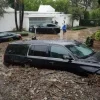The Catalan government has officially declared a state of emergency, extending water restrictions to Barcelona and its surrounding region, due to a severe drought that has lasted over 1,000 days. The situation is being described as the worst drought in modern history, with some areas not receiving rain in three years. The region needs a significant 500mm of rain to make up for the deficit.
Water reserves have plummeted to a critically low level of 16%, triggering the emergency declaration. Existing measures, such as a 20% reduction in agricultural irrigation and a ban on watering public parks in the north, will be enforced in Barcelona. Public and private swimming pools will close, with some exceptions, while car washing will be limited to commercial use. Water parks and ice rinks will also shut down.
Parks will no longer be watered, but measures will be taken to save the city’s 35,000 trees from dying by using groundwater. The restrictions will remain in place for at least the next 15 months. The decision to call a state of emergency comes after plans to reduce water pressure were shelved due to residents’ responsible water consumption, with the average daily usage capped at 200 liters per capita.
The city’s water supply is partly reliant on a desalination plant, which supplies 33% of the city’s drinking water. Additionally, 25% comes from recycled wastewater. However, the production of desalinated water through reverse osmosis is three times more expensive than traditional methods and consumes significant energy, exacerbating the root problem of global emissions.

As the drought continues into the summer, resentment towards tourists is likely to grow, as they are perceived as overwhelming public services and consuming more water than locals. Research has shown that tourists use significantly more water than residents, with a single guest in a five-star hotel using 545 liters of water per day compared to 163 liters for residents.
The drought is not limited to Catalonia, with much of Spain affected by hot, dry weather. In Andalucía, the olive harvest has been devastated, reducing production by 50% and doubling the price of olive oil. The grape harvest has also been poor in many areas, with even vines struggling to survive.
Tourist industry bosses stress that the blame for water waste lies not solely with golf courses and swimming pools but with agriculture, which accounts for 80% of Spain’s water consumption. The country’s over-reliance on agriculture has led to the damming and diversion of major rivers for irrigation, even as temperatures continue to rise and rainfall diminishes.

